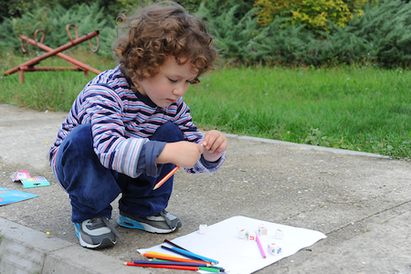 New studies demonstrate that multilingual exposure improves not only children’s cognitive skills but also their social abilities. One study, from the Cornell developmental psychology lab of Professor Katherine Kinzler, presented 4 to 6-year-olds from different linguistic backgrounds with a situation in which they had to consider someone else’s perspective to understand their meaning. For example, an adult said to the child: “Ooh, a small car! Can you move the small car for me?” Children could see three cars — small, medium and large — but were in position to observe that the adult could not see the smallest car. Since the adult could see only the medium and large cars, when the adult said “small” car, she must be referring to the child’s “medium.” Bilingual children were better than monolinguals at moving the car the adult meant. This pattern was repeated in a follow up study of 14 to 16-month-olds who were shown two bananas, one of which was visible to both the infant and an adult, the other visible to the baby yet hidden from the adult’s view. When the adult asked the baby for “the banana” bilinguals would reach most often for the banana the adult could see. “If you think about it,” writes Kinzler, “this makes intuitive sense. Interpreting someone’s utterance often requires attending not just to its content, but also to the surrounding context. What does a speaker know or not know? What did she intend to convey? Children in multilingual environments have social experiences that provide routine practice in considering the perspectives of others.” We want to hear: Are you bilingual, or do you know someone who is? Do you agree that speaking in more than one language hones the ability to consider other points of view—and can you give an example? To join the conversation, click "comments" on our Community of Practice Forum. If you would like to read more about creating a habit around masterful communication, check out our book: Be Quiet, Be Heard: The Paradox of Persuasion.
2 Comments
Julie
4/5/2016 02:10:46 pm
or are linguistic children better at interpreting body language given they may use other queues to translate the meaning?
Reply
susan
4/5/2016 02:57:34 pm
We have wondered about this for quite some time, Julie. Non verbal body language must be included in some way. Also we think that learning 2 languages at a very young age may signal that there are multiple ways of saying the same thing. Such an interesting topic and research area!
Reply
Your comment will be posted after it is approved.
Leave a Reply. |
Archives
July 2024
Categories
All
|
|
Glaser & Associates, Inc.
Executive Offices 1740 Craigmont Avenue, Eugene, OR 97405 541-343-7575 | 800-980-0321 [email protected] |
© 2019 Glaser & Associates. All Rights Reserved.


 RSS Feed
RSS Feed